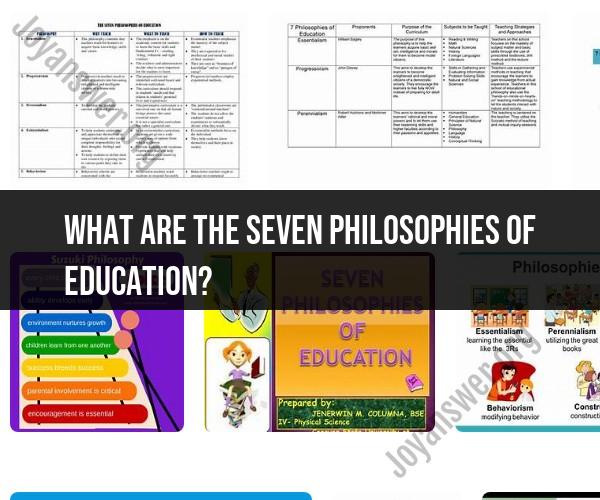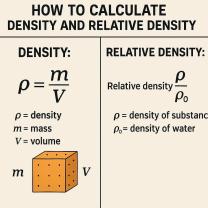What are the seven philosophies of Education?
The field of education has been shaped by various philosophies that influence the goals, methods, and purposes of teaching and learning. While there are more than seven educational philosophies, seven key philosophies often serve as foundational frameworks in educational theory and practice. These are:
Perennialism: Perennialism emphasizes the importance of teaching enduring and universal truths. It draws from classic works of literature, philosophy, and science to provide students with a strong foundation in essential knowledge and skills. Perennialists believe that education should focus on intellectual and moral development, often through the study of great books and rigorous academic disciplines.
Essentialism: Essentialism shares similarities with perennialism but places greater emphasis on a core curriculum of essential subjects. It advocates for a back-to-basics approach, prioritizing subjects like mathematics, science, language arts, and history. Essentialists believe that students should acquire a strong foundation in these subjects before pursuing elective courses.
Progressivism: Progressivism, associated with educators like John Dewey, emphasizes learning through hands-on experiences, problem-solving, and active engagement. It encourages students to explore their interests and learn by doing. Progressivist classrooms often employ group projects, discussions, and real-world problem-solving to facilitate learning.
Existentialism: Existentialism centers on individual freedom, choice, and responsibility. In education, existentialist philosophy values the autonomy of students and emphasizes self-discovery and personal meaning. Existentialist educators believe in fostering critical thinking and helping students find their unique paths in life.
Constructivism: Constructivism posits that learning is an active process of constructing knowledge through individual experiences and social interactions. It suggests that learners build understanding by connecting new information with prior knowledge. Constructivist educators facilitate learning by providing opportunities for exploration, experimentation, and reflection.
Behaviorism: Behaviorism focuses on observable behaviors and believes that learning occurs through stimulus-response associations. Behaviorist educators use techniques such as reinforcement and repetition to shape desired behaviors and learning outcomes. This philosophy has been influential in the development of teaching methods and classroom management strategies.
Humanism: Humanism emphasizes the development of the whole person, including intellectual, emotional, social, and ethical aspects. Humanistic education values student-centered approaches, nurturing creativity, self-expression, and personal growth. It places a strong emphasis on the well-being and happiness of students.
It's important to note that many educators and institutions draw from a combination of these philosophies, adapting their teaching methods to meet the needs of their students and the goals of their educational institutions. Additionally, educational philosophies may evolve over time in response to changes in society, technology, and cultural shifts. Understanding these philosophies can help educators and policymakers make informed decisions about curriculum, pedagogy, and educational goals.
The Seven Philosophies of Education: A Comprehensive Overview
The seven philosophies of education are:
- Perennialism: Perennialists believe that the goal of education is to teach students the great ideas that have stood the test of time. They emphasize the importance of core subjects such as math, science, history, and literature.
- Essentialism: Essentialists believe that the goal of education is to teach students the essential knowledge and skills that they need to be successful in life and in society. They emphasize the importance of rigor and discipline in the classroom.
- Progressivism: Progressivists believe that the goal of education is to help students develop their full potential and to become active and engaged citizens. They emphasize the importance of student-centered learning and hands-on experience.
- Reconstructionism: Reconstructionists believe that the goal of education is to transform society and create a more just and equitable world. They emphasize the importance of critical thinking and social activism in the classroom.
- Existentialism: Existentialists believe that the goal of education is to help students develop their own unique identity and to live a meaningful life. They emphasize the importance of individual choice and responsibility.
- Humanism: Humanists believe that the goal of education is to develop the whole child and to help students reach their full potential. They emphasize the importance of creativity, critical thinking, and social responsibility.
- Postmodernism: Postmodernists believe that there is no single truth and that all knowledge is subjective. They emphasize the importance of critical thinking and multiple perspectives in the classroom.
Educational Philosophies: Understanding the Seven Key Approaches
Each of the seven philosophies of education has its own strengths and weaknesses. Perennialism is often criticized for being too focused on the past and for neglecting the needs of individual students. Essentialism is sometimes criticized for being too rigid and for not allowing enough room for creativity. Progressivism is sometimes criticized for being too focused on the individual and for not preparing students for the challenges of the real world. Reconstructionism is sometimes criticized for being too political and for not focusing enough on academic rigor. Existentialism is sometimes criticized for being too individualistic and for not emphasizing the importance of community. Humanism is sometimes criticized for being too idealistic and for not recognizing the realities of the world. Postmodernism is sometimes criticized for being too relativistic and for not providing students with a clear moral compass.
Despite their weaknesses, each of the seven philosophies of education has something to offer. It is important to understand the different philosophies in order to develop your own teaching philosophy that is aligned with your values and beliefs.
Shaping Educational Practices: Exploring the Seven Philosophies
The seven philosophies of education can shape educational practices in a number of ways. For example, perennialists may focus on teaching the classics, while essentialists may focus on teaching the basics. Progressivists may focus on project-based learning, while reconstructionists may focus on social justice issues. Existentialists may focus on individual development, while humanists may focus on well-roundedness. Postmodernists may focus on critical thinking and multiple perspectives.
It is important to note that most teachers do not subscribe to a single philosophy of education. Instead, they draw on elements from different philosophies to create their own unique approach to teaching.
Ultimately, the best way to shape educational practices is to focus on the needs of your students. Consider your students' learning styles, interests, and goals when choosing teaching methods and strategies.












